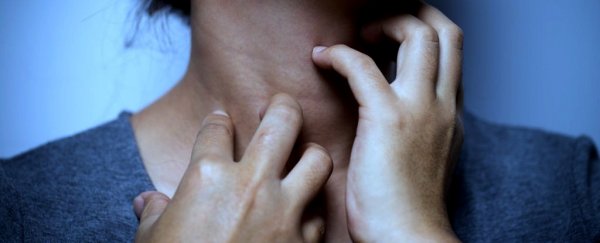You can feel them. Hundreds, no, thousands of tiny insects, crawling all over and under your skin – a teeming infestation that's impossible to ignore. And nobody even believes you.
It sounds like something out of a horror movie, but a new study suggests this nightmarish medical condition – called delusional infestation, in which people become convinced their body is plagued by insects, parasites, and other invisible invaders – is much more common than we thought.
In what's thought to be the first population-based analysis of the prevalence of delusional infestation, researchers from the Mayo Clinic examined a database collecting over three decades of medical records on the residents of Olmsted County, Minnesota.
From 1976 through to 2010, the records identified 35 individual cases of delusional infestation. Scaling up from that data, and per the team's calculations, roughly about 27 out of every 100,000 people in the US could experience the condition.
In other words, there might be almost 90,000 cases in the US right now, given the size of the current population.
What's shocking – apart from the disorder's bizarre symptoms – is this prevalence is significantly greater than what the researchers previously suspected, leading the authors to think the strange condition may be under-reported.
The team acknowledges its estimate is based on a predominantly white sample of patient records given the ethnic makeup of Olmsted County's population, so it doesn't necessarily reflect accurate delusional infestation prevalence in more diverse populations.
But the fact so many people across the US could be experiencing the condition is concerning, especially given the severity of the delusions.
"It's like aliens have infested their skin," one of the team, dermatologist Mark Davis explained to Science News.
The condition, which is also known as delusional parasitosis and Ekbom's syndrome, revolves around what's known as formication: the sensation that small insects are crawling on or underneath your skin.
These physical sensations, which sometimes are traced to other health conditions, can become so distracting and persistent that patients become fixated on the 'insects' responsible for them.
"There's this anxiety that's prevalent toward arthropods," entomologist Gale Ridge of the Connecticut Agricultural Experiment Station, who wasn't involved with the study, explained to National Geographic.
"So when people believe they've been bitten, they naturally default to that. It's almost instinctive."
Once patients are experiencing the delusion, they will often present physical 'evidence' of the pestilence to doctors, offering containers of scabs, skin flakes, or other samples which they believe are indicative of the infestation (but are actually just skin).
More concerning, while the delusions are themselves not harmful to patients, individuals might take it upon themselves to try extreme measures to rid themselves of the bugs, scratching and mutilating their skin, or bathing in harmful chemicals to kill the imaginary pests.
Even though delusional infestation may not be a commonly known condition in wider society, for entomologists who are often approached by patients with the disorder, news of its higher prevalence will not come as a surprise.
Ridge estimates she sees about 200 of these cases per year, while another insect scientist, Nancy Hinkle, from the University of Georgia, says such inquiries dominate about 20 percent of her work time.
"This may in fact be a much more common problem than is reported in the medical literature," clinical medical researcher Daniel Wollman from Quinnipiac University explained to Stat last year.
"The entomologists are seeing 10 times as many people than actually come to the attention of medical professionals. Maybe it's not so rare."
The findings are reported in JAMA Dermatology.
